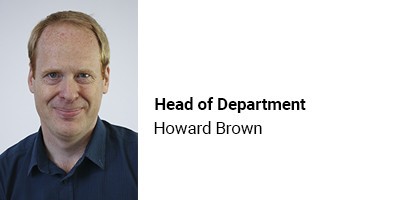Geography A level
Qualification: GCE A Level in Geography
Exam Board & Specification Code: Pearson; 9GE0; Specification
Course Entry Requirements: 4 in English Language GCSE and 4 in Science GCSE
Please make sure that you have understood the overall entry requirements to study at BHASVIC. These are available here and outline the GCSE grades you need to take up one of the Study Programmes at the college.
Length and size of qualification: 2 year single course
Timetable hours: 4.5 hours per week
Assessment method: 3 exams plus a written investigation
Course charge: There is a charge of £25 in the first year only to assist with costs of field work and other study trips. Bursaries and payment plans are available, please see Our Support Service for further information.
BHASVIC Department: Humanities
What will I study?
"Geography is the study of Earth's landscapes, peoples, places and environments. It is, quite simply, about the world in which we live. Geography is unique in bridging the social sciences (human geography) with the natural sciences (physical geography)" [Royal Geographical Society]. Geography investigates current issues through the study of natural and human environments from a local to global scale. Topics covered in the first year include Coastal Landscapes, Globalisation, Tectonic Processes and Hazards, Diverse Places and the Water Cycle and Water Insecurity. In the second year we will study Superpowers, Climate Change, The Carbon Cycle, Identity and Sovereignty and Migration. Students also complete an independent piece of coursework in the second year. You will also be expected to learn and use case studies. These are in-depth examples that focus on a located and defined area or event. They should be used to supply the evidence necessary for essays and other long answers on a topic. While you will be provided with a selection of case studies, you will also be encouraged to develop your own.
Is this course right for me?
Geography suits a wide range of students. It develops skills such as extended writing, numerical and data analysis, IT research, mapping, fieldwork and coursework skills. It combines well with other subjects from the arts or sciences. You will be offered opportunities to visit a variety of sites and locations, some of which are compulsory and others which are recommended but optional. This will include fieldwork in the local area, and opportunities to visit other significant local sites, as well as the option of a foreign trip (Croatia and France have been previous destinations). We organise lectures by university academics and professionals. A successful Geography student would: take an interest in the world around you, do extra “reading around the subject” not just doing work which you have been set, arrive fully prepared for lessons, learn and use appropriate terminology, be prepared to have a go at more advanced activities and both ask and answer questions in class. The course is 20% coursework, and 80% external exam. This subject goes well with Humanities subjects such as History, Classical Civilisation and English Literature or Language. Additionally it complements science subjects like Biology or Environmental Science, and social sciences such as Psychology and Sociology.
Where next?
The wide range of skills developed by studying Geography means that students are highly valued by employers, and Geographers are usually near the top of graduate employment tables. Geography degrees lead to a BSc or a BA degree depending on the balance of Physical or Human Geography involved (BA is normally more human Geography). Some related degree areas could include Anthropology, International Development, International Relations and Earth Sciences. Job roles in this sector can be found in Teaching, Environment, Energy and Sustainability, Geographical Information Systems, Planning and Development Surveying. Jobs where this subject may also be useful include Logistics and Distribution Manager, Market Researcher, Sustainability Consultant and Tourism Officer. Useful websites to research careers and wider progression options could include Royal Geographical Society, All About Careers and The Apprenticeship Guide.
Apply View DepartmentLast year, 39 BHASVIC students went onto study Geography-related degrees at 22 different universities.
Popular universities include Newcastle, UEA, Loughborough, Southampton and Portsmouth. In addition, students have increasingly supplemented their Geography studies by choosing Global Issues as a focus for higher level study including International Development.
Should I study Geography at degree level?
Geography covers the physical and manmade world around us. Courses can include a mix of human, physical and environmental geography or you can specialise in one of these areas. The work / assessment style varies, from online tests, exams, coursework & primary research (interviews/land-use surveys, scientific practicals) to essential statistical software.
There is a huge range of Geography related degrees including:
You can choose to study Geography or a closely related subject, for example
- geophysics
- environmental geoscience
- Geology
- There is also a strong crossover with Environmental Science
Entry Requirements
A-levels (or equivalent) usually required
A-levels (or equivalent) usually required
- Geography for most courses
Top Universities for Geography
Cambridge, Oxford, Durham, Glasgow, St Andrews
Lancaster, Loughborough, Sussex, Royal Holloway – all very high student satisfaction scores
LSE, Exeter, York, Liverpool Hope - all with top graduate prospects
Many of our students choose a combined degree - applications from our students have included:
- Geography with Environmental Mathematics
- Geography with International Study
- Human Geography
- Geography and International Development with a Year Abroad
Example entry requirements (please check):
A-Level/BTEC equivalents:
Royal Holloway Geography A,B,B-B,B,B
Cardiff Geology A,B,B-B,B,C
Edge Hill Geology with Geography Studies UCAS Points: 112-120
Leicester Geology (Foundation) UCAS Points: 104
Canterbury Christ Church B,B,C
Edge Hill Geography (Foundation) UCAS Points: 96
Some examples of Geography-related degrees that our BHASVIC students have gone onto study in the past few years are:
- Earth Sciences
- Engineering Geology and Geotechnics
- Geography
- Geography (Human)
- Geography (including Foundation Year)
- Geography and International Development with a Year Abroad
- Geography with a Language
- Geography with a Year Abroad
- Geography with Environmental Mathematics
- Geography with Innovation
- Geography with International Study
- Geography with Study Abroad
- Geography with Study Abroad in a Modern Language
- Geology
- Geology (Environmental Geoscience)
- Geology with a Year in Industry
- Global Development
- Global Humanitarian Studies
- Global Sustainable Development
- Human Geography and Planning with a Professional Placement Year (Accredited)
- Human Geography with Study Abroad
- Meteorology and Climate
- Physical Geography with a Year in Industry
- Urban Planning and Development with a Professional Placement Year
- Urban Planning, Design and Management
How BHASVIC helps: We have a wide range of information and resources to support students applying for university including subject area guides, personal statement and UCAS resources, super-curricular activity guides, open day and bursary information. We also cover university research, careers, art foundation and all other destinations in depth in tutorial and students can choose an appropriate pathway for them in the second year from UCAS, Employability & Enterprise, Visual Arts, Oxbridge and Medics. Our Spring Futures Fair brings in a huge number of university visitors with workshops and information stands and departments will bring speakers in wherever possible.
The analytical and research skills gained from studying geography are attractive to a range of employers.
Jobs where a Geography degree would be useful include:
- International development worker
- Landscape architect
- Logistics and distribution manager
- Market researcher
- Nature conservation officer
- Sustainability consultant
- Tourism officer
- Transport planner
Career Prospects
In the world of work, students often go into environment and heritage work, but also to general jobs in areas like marketing, business analysis and management. On the human and social geography side, there is a shortage of students with really good Maths skills, and students from these disciplines are in demand from modern industry. An ability to combine good data handling with good communication and social skills will really help start your career.
Geography graduates work for a wide range of employers including government agencies, banks, management consultants and environmental businesses.
Local Market
If you enjoy a challenge, want to make a difference and are eager to take on responsibility, consider joining the Civil Service Fast Stream. The Civil Service Fast Stream is an accelerated leadership development programme that provides talented graduates from a range of backgrounds with the experience, skills and knowledge needed to become senior leaders within the Civil Service. You'll gain a variety of experience through different placements or postings in government departments and agencies. may work in roles involving direct contact with the public.
Examples of apprenticeships and opportunities include:
- Principal Town Planning Officer
- Corporate Travel Counselor
- TUI Retail Travel Advisor
How BHASVIC helps: We have an excellent Careers Hub and careers advisors who are available for appointments through student services. Local jobs are advertised and they will advise on skills and specialist areas such as degree apprenticeships. Students can choose an appropriate pathway for them in the second year from UCAS, Employability & Enterprise, Visual Arts, Oxbridge and Medics. Our Spring Futures Fair brings in a huge number of careers & apprenticeship visitors with workshops and information stands and departments will bring speakers in around the subject area.
You will gain many transferable skills studying Geography that will be valued in the workplace including:
Teamwork, Technical ability, Problem solving, Social Skills, Organisation, Numeracy, Communication, Attention to detail, Administration, Analytics, Discipline
Local Skills
The Local Skills agenda considers job prospects and employment in our local area of Sussex. Many of our students will contribute to the National Skills agenda and go onto find a career in a wide range of sectors. For students in Sussex our local skills are identified as the following sectors:
- Construction
- Creative & Cultural
- Digital (includes IT and Technology)
- Engineering & Manufacturing
- Healthcare (includes Bio Life Sciences and Pharmaceutical)
- Visitor & Hospitality
- Land-based (includes Agriculture and Viticulture)
- Green Skills
Degree choices that match the Local Skills agenda our BHASVIC students went onto study and work in Land-based & Green Skills include:
- Environmental Geoscience
- Agribusiness Management (with Placement)
- Sustainability and Environmental Management
Career choices that match the Local Skills agenda our BHASVIC students went onto study and work in Land-based & Green Skills include:
- Countryside Ranger
- Sustainability consultant
- Planning Officer
How BHASVIC helps: Skills Week in A1 helps students build skills in the workplace and a focus on developing skills through tutorial in A1 and A2 supports students in writing outstanding Personal Statements and CVs. We know our students have already gained a wide variety of skills at home and with extra-curricular activities and will increasingly take up jobs. Our focus is on supporting them to evidence skills already gained, identify gaps and ensure that they transfer that to CVs and applications. This is in partnership with every curriculum area.
